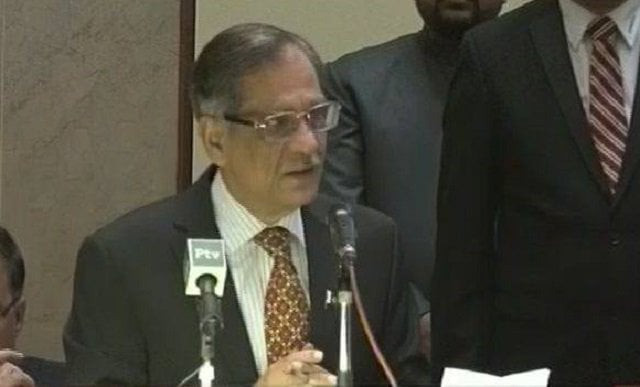CJP lambasts K-P govt for its ‘poor governance’
Calls K-P chief minister; observes he could not find any improvement in K-P hospitals

Chief Justice of Pakistan Mian Saqib Nisar. PHOTO: FILE
The CJP was heading a three-judge bench, also comprising Justice Mansoor Ali Shah and Justice Umar Ata Bandial, hearing a suo motu case regarding the provision of civic facilities in the provincial capital at the Supreme Court’s Peshawar Registry.
The bench earlier grilled K-P Chief Secretary Azam Khan and Health Secretary Abid Majeed about the quantity of waste generated in hospitals in the city, the mechanism to dispose it of, the number of hospitals in the K-P and the capacity of incineration system based available in some major hospitals.
CJP Nisar issues notice to K-P government for update on progress in APS case
The chief justice praised the system adopted in Punjab for waste disposal and asked the official what system K-P has adopted. To everyone’s surprise, the chief secretary replied that the waste of Peshawar is being thrown straight into canals passing through the city.
“We have identified 1,100 points in the city where waste is dumped directly into canals,” the chief secretary said, adding that garbage collected from the city is dumped in a ground located on Ring Road.
However, when the CJP asked him to explain what is done to the waste at the dump site, he said, “it lays there.” He said the K-P government has now issued orders to acquire land for a proper dump site.
The senior government official’s response raised the CJP's eyebrows, as he said, “Dump sites are spreading diseases throughout the city but you have even no programme. You (PTI government) have ruled for five years and have only just acquired land for setting up a site?”
The bench asked the chief secretary to call in K-P Chief Minister Pervez Khattak. The CM, when he appeared before the bench, was also asked a number of questions about the number of hospitals his government had built, the number of new schools set up, and about the population of the city.
The CM told the bench that his priority from the day one has been health and education for which his government has tried to reform the existing system instead of erecting new structures.
The CJP noted that population of the city is growing but it is very unfortunate that no education and health infrastructure expansion has taken place. When Khattak said he has improved the system, the chief justice said he has not seen any improvement in the hospitals he visited.
“You talk a lot about the PTI’s governance in the province but we found nothing on the ground,” the CJP said.
Khattak said he had been elected by people of the province and they will reelect him only on the basis of his performance. The CJP said he respected Khattak as an elected representative but also reminded that it is his duty is to serve the people.
Responding to the bench’s queries, the health secretary later came up with some figure regarding improvement in the education system of the province. However, the CJP directed him to submit this as written report with an affidavit.
The CJP also grilled the Peshawar Electric Supply Company (Pesco) officials for load-shedding in the K-P’. “At night there was a continual load shedding in the area where I am staying,” the CJP said. The official told the bench that supply of electricity in the neighbourhood was disconnected due to fall of a tree.
CJP directs IG K-P to withdraw security protocol of influential individuals
“Areas where there is zero line loss also have zero load-shedding,” an official claimed. However, the CJP asked the people present in the jam-packed hall if the Pesco official was right – a question that was answered in the negative.
The Pesco official told the court that if there was unscheduled load-shedding it was because of a huge shortfall. “The requirement is 1,600 MW but we have only 600 MW,” He told the court.
The CJP asked the chief secretary to how much electricity the province is generating. The secretary answered that the province generates only 75 MW. “The federal government is creating hurdles in the way of the K-P government to construct more dams,” he claimed.
The bench issued a notice to the federal government to explain its position on the issue.



















COMMENTS
Comments are moderated and generally will be posted if they are on-topic and not abusive.
For more information, please see our Comments FAQ